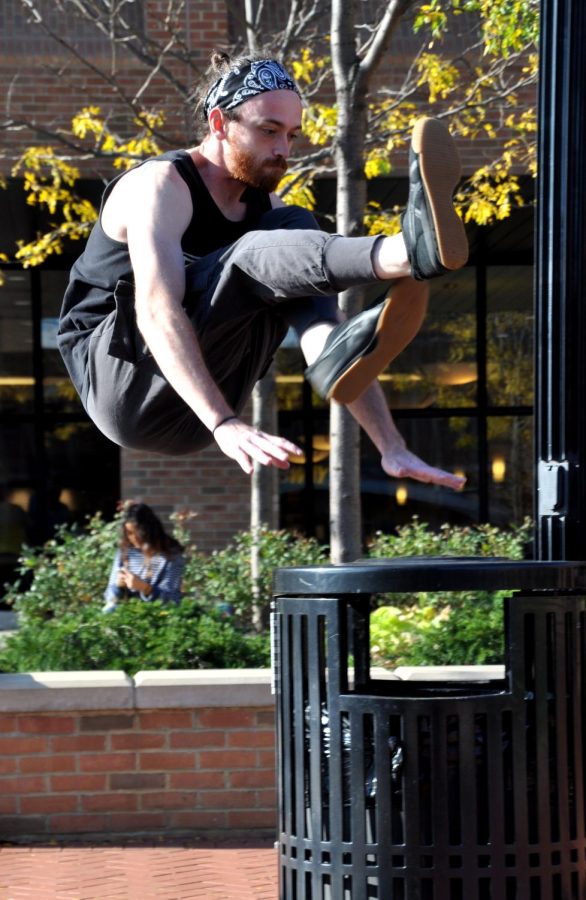Running wild: Parkour lives on at Kent State despite unofficial club status
October 18, 2017
The Kent Parkour Klub is no longer considered a club of the university, but previous members are continuing to bond over the activity, which was first introduced to campus one year ago.
According to the World Freerunning and Parkour Federation, “Parkour is the act of moving from point ‘a’ to point ‘b’ using the obstacles in your path to increase your efficiency.”
With this fairly broad definition of what parkour is, it can be difficult to explain to those not involved in the sport exactly what it is. At Kent State, Forrest Paige found other parkour athletes, and introduced a new trend to campus.
“I founded the (Kent Parkour Klub) back in the beginning of the fall semester of 2016,” said Paige, a recent alumnus of Kent State. “I have been training parkour mostly by myself for the past five or six years before the club.”
Paige also said the practices serve as a way to help those newer to parkour get acclimated to the group. Members start with basic movement before transitioning to complex actions with more speed, distance and accuracy. Paige compared the progression to snowboarding.
“You don’t start off doing flips off of ramps; (you start by) just sliding down the bunny slope, slowly learning the movements and progressing up to larger and larger hills,” he said.
After the group came to be, some people joined because they already had interest in the sport or had been doing it on their own for some time, like Jordan Wolfe, a club member and senior general business major.
“The moment I saw a clip on television of a bunch of European athletes leaping across rooftops, I was immediately captivated,” Wolfe said. “It was likely the next day I gathered up a few of my friends to train in areas near our residence. We had no idea what we were doing, but it sure was a blast.”
Paige had previous experience and love for the sport, but how he came to found the club began while he was doing research for one of his master’s degrees.
“I combined my passion for the built environment and parkour and conducted research on the perspective that parkour practitioners have on the urban environment to understand their unique lived experience of the city,” Paige said.
Paige said he was encouraged to start a parkour community on campus to see what kind of interest it would generate and to observe how campus security and local police would respond.
After roughly a year since establishment, the group is no longer officially recognized as a club of the university. According to the Center for Student Involvement, members of the club did not renew their status this semester.
“I graduated, so I could no longer run the club because I’m not a student,” Paige said. “And I didn’t find anyone experienced enough to be able to take over the club and teach parkour to others, so it was discontinued.”
Since the group is no longer recognized as a club, they cannot partake in some of the advantages registered clubs are given.
“The benefit of registering as a student group is that you can schedule space on campus and you can apply for funding through various sources,” said Katherine Goldring, the associate director of CSI. “If a group goes inactive, they cannot do those two things.”
Despite the group’s current status, Paige is still involved, and stays in contact with old members through social media and other means so they can practice on campus or other training facilities.
“Practices are group-based,” Wolfe said. “We set a time and place to meet. All levels of skill are welcome. Each member learns from one another.”
Even with events and practices to attend, one of the reasons some members stay in the unofficial club is their love of the sport and the chance to share it with others.
“I became interested in training parkour when I was an eighth grade,” Wolfe said. “The reason I continue parkour is because, really, there is nothing out there that compares.”
Rachel Karas is a general assignment reporter. Contact her at [email protected].

























